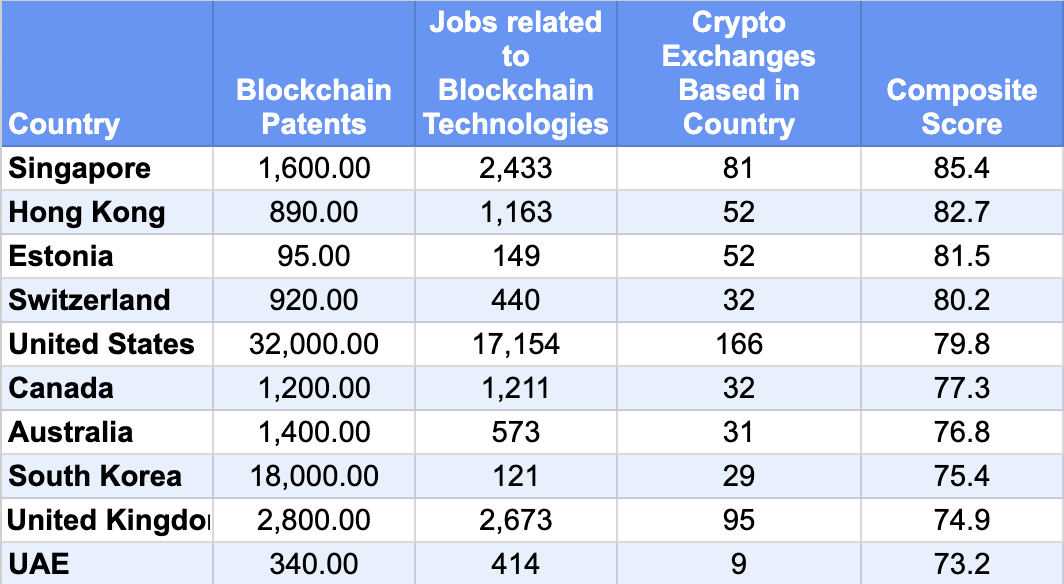Singapore Takes the Lead in Blockchain and Crypto Technology
A recent report has named Singapore as the top country in blockchain and cryptocurrency technology. The study assessed countries based on factors such as blockchain patents, blockchain-related jobs, and the number of crypto exchanges. Each metric was given a weight for importance, and final scores were scaled from 1 to 100 for comparison.
Singapore Emerges as a Global Leader in Blockchain and Cryptocurrency Technology
Singapore achieved an impressive score of 85.4, showcasing its leadership in blockchain innovation. The country boasts over 2,400 blockchain-related jobs and 81 crypto exchanges, highlighting its strong focus on workforce development and infrastructure.
Following closely behind is Hong Kong with a score of 82.7. The city’s financial systems seamlessly integrate blockchain technology, supporting over 1,100 blockchain-related jobs and hosting 52 crypto exchanges.
Estonia secured the third spot with a score of 81.5, showcasing remarkable results despite its small population. The country has produced 95 blockchain patents, supported 149 blockchain-related jobs, and maintained 52 crypto exchanges.
Switzerland claimed the fourth position with a score of 80.2. The country is a leader in decentralized finance, offering 440 blockchain-related jobs and hosting 32 crypto exchanges.

Top 10 Blockchain Nations 2024. Source: ApeX.
Surprisingly, the United States ranked fifth with a score of 79.8. The country has registered 32,000 patents and offers over 17,000 blockchain-related jobs. With 166 crypto exchanges operating within its borders, the US remains a significant player in the global crypto space.
A developer report from Electrical Capital in 2024 sheds light on why the US may be lagging in the global blockchain race. The report indicates that the US has lost 2% of its market share in the last five years, particularly in emerging markets like India, Ukraine, and South-East Asia.
“Thank you for compiling and sharing this data. It highlights once again that the United States is struggling to keep pace with innovation due to outdated regulations,” one user commented on the findings.
Canada, Australia, and South Korea secured the sixth, seventh, and eighth positions, respectively. Canada scored 77.3, with 1,200 patents and jobs, showcasing its commitment to innovation. Australia earned a score of 76.8 with 1,400 patents and 573 blockchain jobs. South Korea produced 18,000 patents, the second-highest globally, earning a score of 75.4.
The United Kingdom ranked ninth with a score of 74.9, offering 95 crypto exchanges and over 2,600 blockchain-related jobs. The UAE rounded out the top ten with a score of 73.2, producing 340 blockchain patents and hosting 414 jobs alongside nine crypto exchanges.
Rising Stars in Blockchain Technology
While established leaders like Singapore dominate the rankings, emerging markets are showing promise in blockchain innovation. African countries such as Nigeria and Kenya are leveraging blockchain to address issues like financial exclusion and inefficient supply chains.
Latin America is another region making strides in blockchain adoption. Countries like Brazil and Argentina are exploring blockchain for transparent governance, digital identity, and stablecoins to tackle economic instability. These nations are fostering innovation through regulatory sandboxes and pilot programs, which could propel them up the rankings in future studies.
Beyond Singapore, Southeast Asia is also progressing in blockchain technology. Vietnam and the Philippines are embracing blockchain for remittances and decentralized finance, driven by high cryptocurrency usage rates and strong tech adoption.
Countries that invest in talent, infrastructure, and regulation are shaping the future of digital innovation and revolutionizing global industries. A spokesperson from ApeX emphasized the importance of leading countries in blockchain in inspiring other nations to follow suit, stating:
“These leading countries are not just adopting the technology but are actively shaping its future. Their efforts signify a global move towards decentralization and transparency,” the ApeX spokesperson told BeInCrypto.
As these nations continue to invest in infrastructure, workforce development, and regulatory clarity, the landscape of the crypto space will evolve. The potential of blockchain technology to transform industries ensures that the race is far from over, with new leaders likely to emerge in the years to come.



